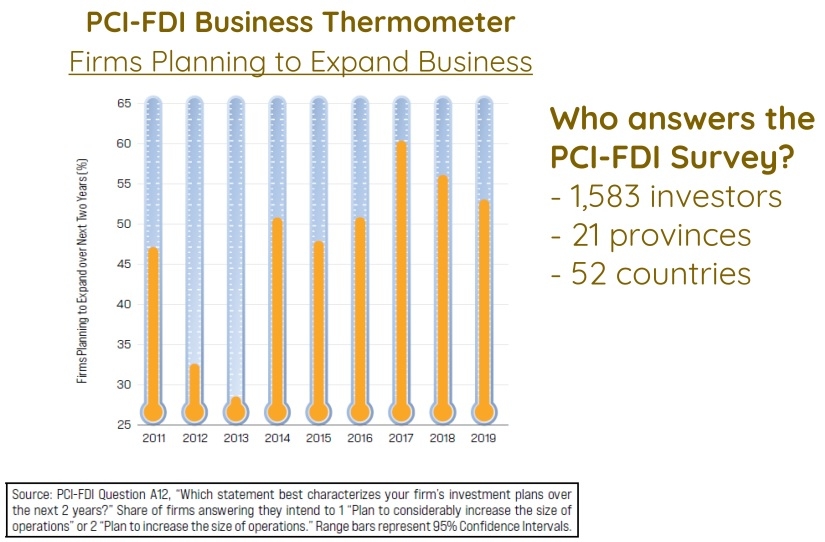Localities usher in proactive values for high development
 |
| Localities usher in proactive values for high development |
Investing in rural clean water, Mai Thanh JSC in the northern province of Nam Dinh has completed part of the system in a project, but is trying to cope with administrative procedure and capital complexities.
“We have asked for help from different departments but the provincial authority said that there is not enough budget to support us. We do not know what to do,” said Nguyen Thi Thanh, director of the company.
According to her, in other provinces this type of project has been actively supported by local authorities. “I wish the authority could facilitate us via an open policy like other provinces,” Thanh remarked.
For many years, Nam Dinh has stood in good stead in the Provincial Competitiveness Index (PCI) rankings, collated by the Vietnam Chamber of Commerce and Industry (VCCI) under the support of the US Agency for International Development (USAID) to measures economic governance and promotes local socio-economic development in each of Vietnam’s cities and 63 provinces, but has yet to see a real breakthrough.
At the number 33 spot in 2019 in the PCI Report 2019 launched last week, Nam Dinh’s indicator of entry cost remarkably improved from 6.49 to 8.23, but the indication of proactivity reduced from 6.51 to 6.05.
However, the result for Nam Dinh is still much better than Hung Yen province. With nearly 500 enterprises including 255 foreign-invested enterprises (FIEs) operating across seven industrial zones, it is the only northern delta province, along with nine mountainous and central highland provinces, with a low PCI score. Hung Yen also has the lowest indicator of transparency at 5.98 points. Five out of 10 sub-indices were reduced, in which proactivity decreased from 6.19 to 5.95.
“Since the early 2000s, we recognised that some localities have similar geographic position, infrastructure, and workforce quality, but huge differences in economic development or attracting investment. And the core issue is the provincial authority’s capability of management,” said Vu Tien Loc, chairman of the PCI Steering Committee.
Dau Anh Tuan, director of the VCCI’s Legislation Department, said that the response of enterprises in the survey over the years has shown that authority’s proactivity is the key for renovation. “For an unclear policy of the state, some provinces will wait for better guidance, some others even cause obstacles to enterprises, while a few provinces are proactive to give out solutions to facilitate enterprises in accordance with regulations,” he said.
Good crop picture
Jumping to the group of excellent PCI results in 2019, the northern province of Bac Ninh is a model of proactivity through the initiative of enterprise doctors, which helps resolve enterprises’ troubles from the basic level.
“Our procedure is close, exact, and quick to timely support firms, particularly foreign investors. If enterprises want to do something, we will immediately find a solution. We cannot tell them that we do not have enough conditions or they must wait one or two months,” said Nguyen Huong Giang, Chairwoman of Bac Ninh People’s Committee.
According to the PCI 2019 result, around 54 per cent of 12,430 surveyed enterprises positively assessed local authority attitudes, at the highest level since 2006. Over 80 per cent of enterprises agreed that provincial people committees are flexible in accordance with regulation to create a favourable trading environment for private enterprises. Some 65.8 per cent of enterprises said that the new rising issues were actively and creatively handled by these committees. Also last year, 82.5 per cent of enterprises were satisfied with the local authorities’ responses and ways of handling obstacles, which is noticeably higher than the 77.4 per cent in 2018 and 76.7 per cent in 2017.
Addressing the PCI launch event, Loc said that the result reflects enterprise trust on the golden crops of Vietnam’s economy, including the steering of authorities. “The PCI 2019 noted that 51 per cent of asked enterprises would expand manufacturing scale in the next two years. This level is quite high compared to the rate of 48 per cent in the PCI 2018 and much higher than the bottom rate of 32 per cent in 2012,” Loc said.
Although the survey was carried out before last November, at a time when the economy was without worries of economic downturn due to coronavirus, Loc still believes that the trust of enterprises on the authorities’ steering is still optimistic.
“The trust in the market can be reduced but the trust on authority will increase. Success in fighting against the pandemic has reinforced this trust. When we discuss economic recovery, it does not mean we come back to yesterday and apply old methods. In that case, a tectonic authority will be the core to loosen the knobs along with creativity and responsibility of enterprises,” Loc said.
Improvement required
Pointing out positive changes in administrative reforms through enterprises’ perception of the quality of administrative procedures, Loc also frankly said that some areas of administrative procedures related to land, taxes, fees, social insurance, construction, and transportation are still quite troublesome for enterprises.
“Businesses are waiting for urgent reviewing and removing overlaps and inadequacies in the legal system. There should be mechanisms to encourage and protect people who think and do for the common benefit. This will be a safe iron coat and new drive for the development of provincial governments,” Loc said.
It is suggested that the provincial governments in Vietnam need to focus more on promoting legal reforms to facilitate business activities and stimulate domestic investment growth and attract foreign investment capital. To compete effectively on the global playing field, Vietnam needs to further strengthen reforms in all four aspects of law enforcement, legislature, judiciary, and labour issues. Moreover, the country also needs to continue encouraging the participation of businesses and people in the policy-making process to ensure that reforms are positive and sustainable.
According to Tuan from the VCCI, although the business environment has been more equal between private and state-owned enterprises, and between domestic groups and FIEs, the transparency of the business environment need to be further improved.
According to lead researcher of the PCI research team Edmund Malesky, in the context that enterprises are trending towards applying automation, the number of labourers and jobs will decrease. “Vietnam should continue with education reforms to improve secondary, tertiary, and university education; refine reforms through consultation with the business community about needed skill sets; and organise business and management training and support programmes post-pandemic. It will be critical,” Malesky said.
| Michael Greene - Mission director, USAID
The PCI is one of USAID’s most effective initiatives and I appreciate the effective co-operation and implementation by the Vietnam Chamber of Commerce and Industry (VCCI). It has made good use of its status as connector between provincial governments and businesses to bring about transformation and benefits to domestic and foreign businesses operating here, especially private local ones. More than 140,000 domestic and foreign-invested enterprises have participated in PCI surveys. The fact provincial authorities wait for PCI results and findings to diagnose local governance to make adjustments has significantly contributed to promoting the role and voice of the private sector in Vietnam. Annual PCI reports have become instrumental in conveying the collective voice of businesses, big and small, to governments at all levels on areas that are important to business development, and even sensitive areas such as informal charges and transparency. In Vietnam, the VCCI and the USAID co-operated to develop the PCI and released the first PCI report in 2005. The following year a similar initiative was introduced in Cambodia, and in the following years, several other countries implemented projects modelled after the PCI with support from international donors like the UN Development Programme, AusAid, and the World Bank. USAID provided assistance to five projects outside Vietnam: Indonesia in 2007, El Salvador in 2009, Kosovo in 2011, the Philippines in 2013, and most recently Burma in 2018. To date, 16 countries have implemented a model similar to PCI to measure economic governance based on firm perceptions. The adoption of PCI-like programming outside of Vietnam is inspiring, and it really shows that this initiative has impact and helps foster change. Strong reform efforts at all government levels in Vietnam deserve to be recognised. |
What the stars mean:
★ Poor ★ ★ Promising ★★★ Good ★★★★ Very good ★★★★★ Exceptional
Related Contents
Latest News
More News
- Foreign leaders extend congratulations to Party General Secretary To Lam (January 25, 2026 | 10:01)
- 14th National Party Congress wraps up with success (January 25, 2026 | 09:49)
- Congratulations from VFF Central Committee's int’l partners to 14th National Party Congress (January 25, 2026 | 09:46)
- 14th Party Central Committee unanimously elects To Lam as General Secretary (January 23, 2026 | 16:22)
- Worldwide congratulations underscore confidence in Vietnam’s 14th Party Congress (January 23, 2026 | 09:02)
- Political parties, organisations, int’l friends send congratulations to 14th National Party Congress (January 22, 2026 | 09:33)
- Press release on second working day of 14th National Party Congress (January 22, 2026 | 09:19)
- 14th National Party Congress: Japanese media highlight Vietnam’s growth targets (January 21, 2026 | 09:46)
- 14th National Party Congress: Driving force for Vietnam to continue renewal, innovation, breakthroughs (January 21, 2026 | 09:42)
- Vietnam remains spiritual support for progressive forces: Colombian party leader (January 21, 2026 | 08:00)


 Tag:
Tag:


















 Mobile Version
Mobile Version